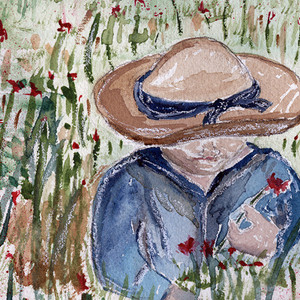24 May Thu 2018
Ask Arlene about herbs that do not require a lot of sun and more©
Ask Arlene about herbs that do not require a lot of sun and more©
By Arlene Wright-Correll
One of my readers asks, “I have a lot of shade on my property and I want to grow some herbs that do not require a lot of sun. Can you suggest some?”
Yes, while we are quite the opposite at Home Farm Herbery many of our culinary herbs do require lots of direct sunlight such as basil and oregano, which originated in the sunny Mediterranean. Yet other herbs usually listed as full-sun plants will do just fine in partial shade and these include parsley, anise hyssop, lemon balm and shiso are among the best herbs for dappled light or areas that receive only a couple of hours of direct sun daily.
There are plants such as wild ginger, spicebush and sweet woodruff that will do beautifully in a shady garden site, and will add enticing new flavors and aromas to your cooking.
For beds and borders shaded by trees, fences or buildings I suggest you consider these herbs for shade. Sweet woodruff, Anise hyssop, Wild ginger, Parsley, Shiso (which is the now common name for the Asian culinary herb, seed, or entire annual plant of Perilla frutescens variety crispa, belonging to the mint family), Lemon balm and Spicebush
(Spicebush variety Lindera benzoin is a flowering plant in the family Lauraceae, native to eastern North America, ranging from New York to Ontario in the north, and to Kansas, Texas, and northern Florida in the center and south).
Another reader asks, “Do you know of a natural remedy for Mosquito bites?”
Yes and you will find it even in most backyards. Plain old plantain (Plantago, various species) is one of the best herbs to treat bug bites. This is a very common weed, often growing in compacted soil along sidewalks and driveways. To use the plant as first aid for a mosquito bite, crush a few leaves and rub them on the bite.
Yet another reader asks, “How do I get rid of tomato hornworms which seem to attack my tomatoes each season?”
If you are killing wasps in your area you may be killing off the Braconid wasp which is
an organic solution. This beneficial insect is as creepy as it is useful in the garden.
The mature female wasp lays eggs just under the skin of the tomato hornworm and several other garden pests. When the wasp larvae hatch, they feed on their living host animal before tunneling out through the host’s skin to pupate. As you’d imagine, this weakens and eventually kills the host. Attract braconid wasps to your garden with small-flowered, nectar-rich plants, such as yarrow, dill, fennel, sweet alyssum, chamomile and buckwheat. Just plant a row between your tomato plants in the event you do not have herb beds such as we do at Home Farm Herbery.
May the Creative Force be with you as you tread the earth lightly!

